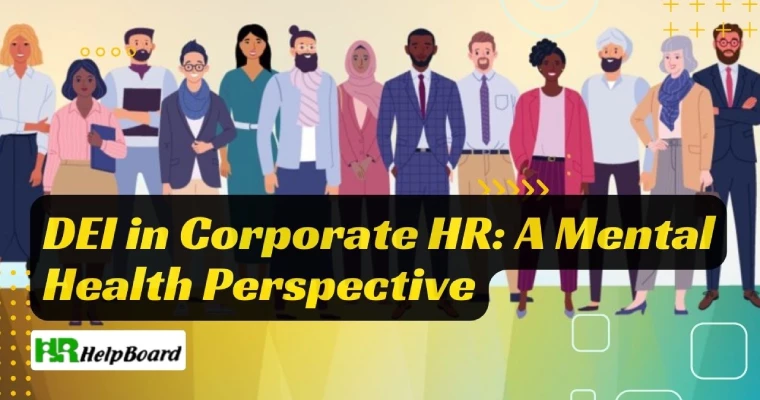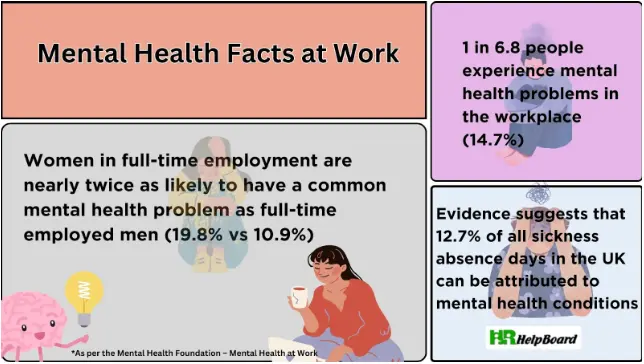
Reviewed by HR & Business Communication Experts Updated for 2026 Professional Communication Standards
How DEI HR strategies Impact Businesses - A Mental Health Perspective
Business workforce diversity has become a major topic for all kinds of enterprises. On one hand, DEI activities and initiatives enhance the cultural diversity of the company. But the wrong kind of DEI may come off as forced and in fact may recruit individuals without the right preparation. This often leads to needless stress and mental fatigue at work.
Being able to sync in with your team while giving space for diversity is a hard task. However, this is the only real way to integrate DEI in the workplace without inviting mental health issues in. This article looks at how DEI HR strategies impact businesses. We will also look at the role of HR in mental health and how DEI works with HR transformation. Let’s start:
Introduction
Diversity, Equity and Inclusivity in the Workplace
DEI in full form stands for Diversity Equity and Inclusivity. It is a crucial aspect of global businesses since it impacts how well they operate across physical and digital domains. Since the rise of remote work, the prospect of hiring global talent has raised the bar for quality recruits across the world. This includes working with multicultural teams, understanding offshore markets and orienting teams to tap into diversity fuelled workforces. Naturally, all of this requires specialized training for HR professionals focused on integrating DEI organically.
Why is Diversity, Equity, and Inclusion Important?
Since companies stand to reach markets with in-country professionals using remote work, they must manage their DEI initiatives well. This directly factors in work-related mental health and team-building activities that foster communication and growth. That is why, DEI HR policies must include mental health as a direct extension. Here’s a link on DEI practices popular across the world. Now let’s look into how DEI and mental health directly correlate with each other:
5 Ways and Benefits of Integrating DEI with Mental Health
-
Conduct Diversity Awareness Drives
-
Develop Peer Support Systems
-
Practice Diversity Showcase and Highlights
-
Foster Feedback for Mental Health
-
Enable Flexible Working for Wellness
Conduct Diversity Awareness Drives
Diversity drives are among the most common CSR/team—building activities out there. And there is a good reason why they are popular. Diversity drives emphasize on ethnicities and highlight what each team member is bringing to the table. They also enable managers to showcase how they intend to leverage the skills of individuals within their existing or incoming project framework. This helps other members better understand how to work with that member or work within the project framework.
Diversity drives raise awareness morale, boost intractability and create a more inclusive environment. They also include ethnic date events or holidays which is another great way to endorse diversity at work. All of this enhances your company’s brand relevance in the media and promotes overall DEI in the workplace. However, since these are often nuanced topics needing political sensitivity, it is crucial to conduct DEI training for human resource professionals to turn them out well.
Develop Peer Support Systems
Studies have shown that working in teams with support systems like co-conducted research has a positive impact on output. This applies to diverse teams as well and may indeed make the path to their success. The most common way to do this is the buddy system. This involves grouping two or more employees together so they tap into each other’s work when needed. This also extends to report filing sharing and other processes if needed.
When I train leaders in empathy, one of the first hurdles I need to get over is this stereotype that empathy is too soft and squishy for the work environment. It’s easy to debunk that. There are decades of evidence showing that empathy is a workplace superpower. --- McKinsey
With diversity, buddy systems also enable mental health support. Particularly true for high-stress environments, buddy systems also give another lead to HRs about behavioral tendencies. This often works as a great alternative to the versions of the employee in question since it offers a different perspective on the problem. Further, it enables workers to collaborate more effectively while sharing accountability as well as rewards and recognition.
Practice Diversity Showcase and Highlights
Diversity showcases are a deep dive version of diversity awareness. It relates to the nuances of cultural values that workers carry as part of their person and identity. As such, acknowledging what they are bringing to the table is a good way to build familiarity with it. This also enables managers to highlight the elements they want to integrate into their active working process. Further, this approach also adds to the diversity of your brand story. Developing product or brand pitch portfolios based on diversity adds authenticity and charm to your pitch and highlights your DEI initiatives.
The approach to diversity is defined by openness and clarity of function. By giving enough face time to all workers and team members, managers bring out the best in everyone. Further, they will contribute more actively to their job role when they see it highlighted on a regular basis. The particular nuance of something like design choices is a crucial element of both brand and team personality which also impact performance management. So, highlighting how each designer or copywriting when it comes to text offers a chance to showcase strong points and endorse them to others.
Foster Feedback for Mental Health
Positive feedback or what is now often called “feedforward” is a good way to generate rapport with team members. Feedback (or feedforward) also offers the opportunity to fill up gaps in communication. This includes differences in understanding, clarity, messaging, workflow and other factors. Naturally, the communication in feedback sessions must remain two-way and consider cultural elements to factor in DEI initiatives. Further, they must incorporate feedback activity with justification on key points to integrate team members while giving them validation across their suggestions.

Workplace negativity, particularly in culturally diverse organizations, crops up when there is a lack of communication. This podcast from Entrepreneur hosted by their Editor in Chief looks into the best tactics for diffusing negativity buildup. They mention broad ideas like “interconnectedness” “Small ego, big goals” etc. to help counter both negativity and mental health issues build-up. If you want to bring new ideas and maintain fresh working processes in your DEI framework, consider incorporating some of these into your working model.
Enable Flexible Working for Wellness
One of the best things to come out of the pandemic is the hybrid working model. While most business leaders still insist that the on-site job role is the best one, hybrid working offers a lot of chances to reduce stress and create more open and productive environment. Generally speaking, working in a team is best if done from the same place. However, it is also a good idea to create more dynamic team setups to give workers more space and time in their lives. Most workers report that commutes are a hassle, so incorporating hybrid work is a good way for businesses to get more out of employees.
Further, creativity in work demands a change of scenery or ambiance which may not be available from the office space. In such cases, using hybrid and remote options may also create more mental health improvement options while keeping work quality and quantity up to par. This is particularly true for female workers who often need days off for family reasons and also have a higher risk of mental health as highlighted in this McKinsey report.
How Should Companies Approach DEI and Mental Health?
Mental Health is a major issue for businesses today and diversity done right offers some great solutions to businesses. Of course, this balancing act is complex and demands real empathy and understanding instead of a business-as-usual approach. However, the payoff is also vital since studies show empathy in business produces universally better results. Companies of all sizes should consider making DEI investments with a strong emphasis on mental health. This may include mental health training for HR professionals and other quality-enhancing initiatives. For more insights into hot topics in the HR world, check out our other blogs.
Author & Reviewer
This content is prepared and reviewed by HR and workplace communication professionals and is updated to reflect current professional Standards.
Latest JobsView All
-
Data Analyst... Noida 21 Feb 2026 Ascent Human Solutions Pvt. Ltd..
-
Editorial Manager - English @ ... New Delhi 17 Feb 2026 Ascent Human Solutions Pvt. Ltd..
-
Assessment Lead (English) @ De... New Delhi 17 Feb 2026 Ascent Human Solutions Pvt. Ltd..
-
Marketing Manager @ Delhi... New Delhi 17 Feb 2026 Ascent Human Solutions Pvt. Ltd..
-
Manager Quality... Gurgaon 13 Feb 2026 Ascent Human Solutions Pvt. Ltd..



